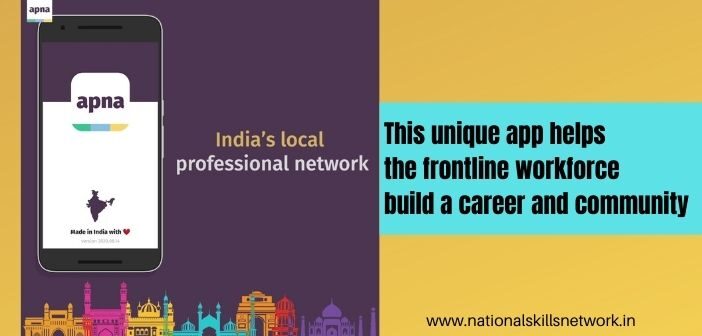On one of the days during the pandemic, a 22-year-old was in search of a job as a nurse in a hospital. She learnt about the Apna app from her friend and downloaded it on her mobile phone in hope of finding the right job. She not only found the right job suitable for her skills within four to five hours of registering on the app, but she could also help other friends find jobs in the domain. Besides landing herself with a job in her locality, she was also part of the network of nurses on the app. This community within no time helped the woman source masks and PPE kits for rest of the nurses in the hospital. Isn’t this an impeccable example of the power of community?
Let me now share an inspiring growth story of Mr. Jawed, who was a driver by profession and lost his job during the pandemic. He joined Apna app in hope of finding gigs to run his day-to-day living. In the app, there is a community called “Start your own business”. While he was trying to find a job, he found a person who was selling dry fruits and mangoes from a small town near Mumbai. Then Jawed thought he can sell these to other places by collaborating with this farmer. Today, they are doing this business together. Jawed also developed his language skills and is now confident and eloquent speaker in English. Now, he has a YouTube channel, where he makes videos and sells the dry fruits online. What an impressive progress Jawed has made, from a gig worker to an entrepreneur.

“Power of community is the heart of Apna”, says Mr. Nirmit Parikh, Founder and CEO, Apna. Apna app, the mobile application is not only helping the job seekers find relevant employment opportunities, but is also helping them build a community. We caught up with Mr. Nirmit Parikh, to understand how Apna is changing the way businesses hire and various unique features on the app that help in developing the aspirational value of the so-called blue-collar and grey-collar workers. Read on to know more and watch the complete video on our YouTube channel, link is given below.
Q: How did you get inspired to build Apna platform? How is it making a difference in the lives of job-seekers?
A: The mission of Apna is to connect frontline workers with opportunities. We try to achieve this by doing three things:
- Help them build a professional profile with a digital visiting card
- Give them access to find the best local jobs around them
- Help them connect with folks with similar skills, same locality, or working in similar factories or similar organizations
Apna platform is where they discuss work-related problems, share gigs with each other, and collectively help each other grow.
To answer why I thought of building something like Apna, it is a very interesting and an organic journey. One of the earlier companies that I worked for, was using the services of blue and grey-collar workers but it was not working out. Market place is two-sided and we need to think of employers as well as the candidates. Apna is a strong engineering focused company. Along with my team, I spent a lot of time researching and understanding what are the problems of blue-collar workers and also spent time interacting with HR personnel and recruiters to understand what issues they face. This way we wanted to bring them together on a platform and mutually benefit both the employer and the employee.
Q: So, you are utilizing technology to bridge informal workforce to become formal?
A: Yes. Today if you see, in India, three quarters of jobs might be formalized but are still hired in a non-formalized way. For instance, in the case of a welder, the hiring is usually done by asking a welder if he knows any other welder. He will know someone in the field, and he will have friends who are welders too.
So, Apna offers opportunities for the workers to get access not only to the formalized way of hiring but also to the non-formalized way of hiring. They can get connected to the people in their domain or network, find friends who are working in those companies, find gigs, etc., and all of this is user-generated content.
Q: How does Apna address the growing gig jobs?
A: In Apna, employers can post short-term jobs, long-term jobs and also gigs. Organizations like Swiggy and Zomato also are hiring gig workers through Apna. Formalized companies like Jio and Reliance are also hiring through Apna. An employer can give a short description and the skills that are required. We have an algorithm which shows this to right people with right skills. We also screen the person before we allow them to give the employer a call. This way the job-seekers can not only find jobs but also gigs relevant to their skills.

Q: The Apna app uses a mix of English and local language, what is your idea behind this?
A: Apna app has redesigned languages. People see English as a very aspirational language. Even though they want to select English as the language on the app, their understanding quotient is very low as they have not been speaking English much. As they do not have training in English they will stop interacting with other folks. That is when we thought what if we combine English with local languages.
If you are opening Apna app in Delhi, it will be in thoda English. If you are opening the app in Bengaluru, it will be in swalpa English. We have redesigned the languages for the app. As we wanted the candidates to be aspirational about English. But we also don’t want them to lose their touch on local language. Because confidence comes in one’s local language as it is one’s mother tongue.
Currently Apna is in seven cities – Delhi, Mumbai, Bengaluru, Pune, Ahmedabad, Jaipur, and Ranchi. We are soon looking to expand and move to other cities as well. We are also looking towards international markets to expand.
Q: As we understand, Apna app is not just a recruitment app. So how is it creating a complete environment? How does it make a difference for a HR person to use Apna rather than accessing a recruitment app?
A: Access to jobs is one of the aspects we want to solve. On Apna, we build a digital profile and give the job-seeker a personal website along with a visiting card. Earlier, they might have seen such visiting cards only with their bosses. So, the idea of having a visiting card itself is aspirational. We start that by building confidence in the frontline workers. Then we have communities, community is an interesting way we can scale the trust.
Trust is very important as women are the major part of the workforce. They are usually worried to go to a new place to work. But what if she finds out three of her friends have already worked there? This helps in building trust not only from the employers’ side but also from the candidate’s side. This is where lot of transfusion of opportunities happen.
Even after finding the job, people continue to be on Apna as this will help them in sharing their work with their network. If they are stuck, someone from their network will answer the issue and help them out. Similar to ‘likes’ on other platforms, we have ‘claps’ on Apna. Apna platform not only helps in finding a job but also in growing in that job and thereby building a career.
On the HR front, since we have a big network of blue and grey-collar workers, HR also gets access to the best profiles. As our algorithm can swift through trust score, connections score, number of claps, it will be easy for the HR to find the right candidate. If workers share his/her work, others in that community can react to it. This also helps in understanding the skills of the person. Thereby helping the HR find the best match.














Comments 1